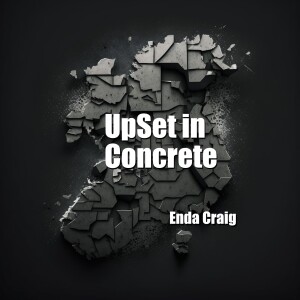
This episode consists of 2 interviews recorded with Enda Craig. One was recorded on th 27th November 2022 and a catch-up interview was recorded 8 days ago on the 2nd of April 2023. Much of the discussion was about judicial reviews and about taking issues to Europe. I have added supporting audio from multiple sources.
Note 1: As a listener, if you think there is anything incorrect in this episode please let me know so that I can take action. 🙏
Note 2: If you are a journalist and your reporting is informed by this podcast and the comprehensive links to source material here, please mention this podcast episode and Backstory.ie in your reporting. 🙏
The case of "Doherty v Referendum Commission"...
------------------------------------------------
... is a legal case that took place in Ireland in 2012.
In 2012, the Irish government proposed a referendum on a European Union treaty, called the Fiscal Stability Treaty. The treaty aimed to strengthen fiscal discipline and coordination among the EU member states in response to the Eurozone debt crisis. The Irish government established a Referendum Commission to provide information to voters about the treaty and the referendum process.
Pearse Doherty, a member of the Irish parliament and a member of the Sinn Féin political party, challenged the impartiality of the Referendum Commission in the High Court. He claimed that the Commission was biased in favour of a "Yes" vote and that it was acting outside of its statutory powers.
Doherty argued that the Commission had used public funds to produce material that promoted a "Yes" vote, and that it had failed to provide balanced information to voters. He also claimed that the Commission had exceeded its statutory powers by providing information about the treaty's implications for Ireland's membership of the European Union.
The High Court rejected Doherty's claims and found that the Referendum Commission had acted impartially and within its statutory powers. Doherty appealed the decision to the Supreme Court, but the Court also dismissed his appeal.
The outcome of the case confirmed the independence and impartiality of the Referendum Commission and its role in providing information to voters on important issues such as EU treaties. The case also highlighted the importance of transparency and fairness in referendum campaigns.
the case of "Pringle v The Government of Ireland"...
----------------------------------------------------
... is a legal case that was heard in the Supreme Court of Ireland in 2012.
The case was brought by Thomas Pringle, an independent member of the Irish parliament, who challenged the constitutionality of Ireland's participation in the European Stability Mechanism (ESM), a mechanism set up to provide financial assistance to EU member states in financial difficulty.
Pringle argued that the ESM was unconstitutional under Irish law because it transferred significant powers and functions of the Irish state to an international organization without the approval of the Irish people through a referendum. He argued that this violated the principle of popular sovereignty, which is enshrined in the Irish Constitution.
The government of Ireland, which was the primary defendant in the case, argued that Ireland's participation in the ESM was necessary to address the financial crisis in the Eurozone and that it was consistent with Ireland's obligations under EU law.
The Supreme Court ultimately ruled in favor of Pringle, finding that the government's decision to participate in the ESM without holding a referendum was unconstitutional. The Court held that the ESM treaty represented a significant transfer of sovereignty from the Irish state to an international organization, and that this transfer of powers required the approval of the Irish people through a referendum.
The outcome of the case was significant because it established an important precedent for the protection of the principle of popular sovereignty in Irish constitutional law. It also highlighted the tension between Ireland's obligations under EU law and its constitutional commitment to popular sovereignty. The case led to a referendum on the ESM treaty, which was held in Ireland in 2012 and was passed by the Irish people with a large majority.
NSAI I.S. 465:2018+A1:2020 - Assessment, testing and categorisation of damaged buildings incorporating concrete blocks containing certain deleterious materials and Amendment 1:2020
https://shop.standards.ie/en-ie/standards/i-s-465-2018-a1-2020-1136409_saig_nsai_nsai_2889155/
NSAI I.S. EN 771-3:2011+A1:201 - Specification for masonry units -Part 3: Aggregate concrete masonry units (Masonry unit = concrete block)
https://shop.standards.ie/en-ie/standards/i-s-en-771-3-2011-a1-2015-870940_saig_nsai_nsai_2983456/
NSAI I.S. EN 12620:2002+A1:2008 - Aggregates for concrete
https://shop.standards.ie/en-ie/standards/i-s-en-12620-2002-a1-2008-858169_saig_nsai_nsai_2983694/
2017 Report of Expert Working Group on Defective Concrete Blocks
https://assets.gov.ie/100218/78fd81fe-ab44-441b-ba10-6a9df4434c48.pdf
Answer to Pádraig Mac Lochlainn's question asking who is on the panel that designed IS.465
https://www.oireachtas.ie/en/debates/question/2022-07-07/163
Dr Andreas Leeman's talk - " The mica crisis in Donegal - a case of internal sulphate attack"
https://www.youtube.com/watch?v=lXyP-xbe-20&t=19711s
Robbie Goodhue's talk "Water in masonry concrete"
https://www.youtube.com/watch?v=lXyP-xbe-20&t=23041s
RTÉ Radio 1 This Week interview by Angus Cox of engineer, Aidan O'Connell
https://www.rte.ie/radio/radio1/clips/22089005/
Highland Radio interview with Cllr Martin McDermott
https://highlandradio.com/2022/11/09/defective-concrete-blocks-redress-process-set-to-move-again/
Greg Hughes Nine til Noon Show in Brussels with MEP Luke Ming Flanagan
https://youtu.be/YNokfbw0ox0?t=1141
Profile of Peter Sweetman by Mick Clifford in the Irish Examiner
https://www.irishexaminer.com/news/spotlight/arid-40806339.html
No comments yet. Be the first to say something!